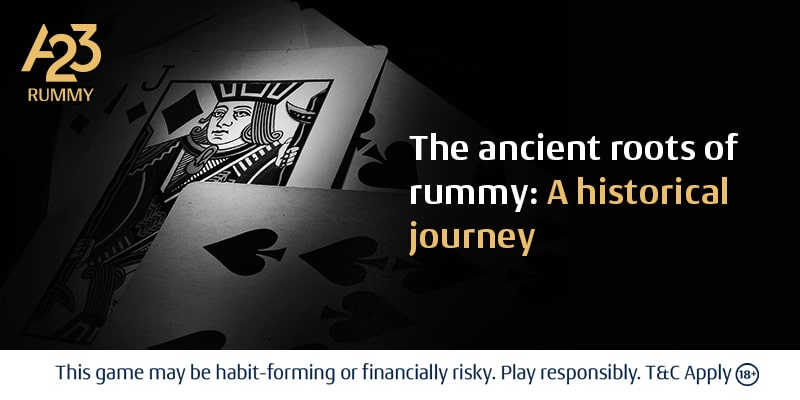
Have you ever been enthralled with the elaborate background of rummy history? Take a fascinating trip back in time with us to learn about the fascinating rummy history, a game that has endured and won over innumerable players all over the world.
Understanding Rummy History
With a vast and storied history spanning decades and countries, rummy history has been a part of many different cultures and civilizations. Rummy’s rise, rummy history, rummy rules and how to play rummy from modest origins to its current renown is evidence of its continuing popularity and allure to all people.
The origins of Rummy History
Unbelievably, the origins of rummy history may be found in antiquity, when several civilizations played related card games in different variations. Rummy-like games may have been played as early as the 19th century in Mexico, according to historical accounts, setting the stage for what and how to play rummy would eventually become one of the most popular card games worldwide.
Rummy History and Rummy Rules
Rummy and rummy rules have spread its influence to far-off places and diverse cultures as time went on, continuing to change and adapt. There are numerous variations of Rummy and rummy history that represent the diversity of human culture as a consequence of the infusion of local traditions and customs into how to play rummy games in each place.
Rummy found a fertile environment to grow and prosper in the Indian subcontinent, enthralling players with its unique combination of skill, strategy, and tradition. The game that became known as “Indian Rummy” swiftly gained popularity across the nation, appealing to players of all ages and socioeconomic backgrounds.
Indian Rummy
But you might be wondering, just what is rummy, how to play rummy or Indian rummy? In order to win Indian Rummy, players must create sets and sequences of cards, which is the essence of the card game rummy. The goal is the same whether you’re playing the fast-paced Gin Rummy or the traditional 13-card Indian Rummy: arrange your cards in the most favorable way to declare victory.
Let’s now explore how to play rummy and understand the numerous advantages that Rummy provides. Beyond just being fun to play, rummy offers players several social and cognitive advantages. Playing card games like rummy, learning rummy rules, understanding rummy history can boost memory recall, develop strategic thinking skills, and increase cognitive function, according to studies.
Rummy and friendships
Furthermore, Rummy and rummy history promotes friendships and a sense of solidarity among players by acting as a stimulus for social engagement and connection. There’s no feeling of friendship or shared experience like there is when playing tournaments with seasoned pros of having friendly matches with family members or discussing rummy history. The sense of achievement one gets from perfecting their skills and winning the game, though, may be the biggest reward of all. The rush of winning in Rummy is unmatched, whether you pull off a perfect triumph or make a bold play to change the course of the game.
Modern-day Rummy
In the twentieth century, rummy gets a contemporary makeover and becomes the standard card game for both social and family get-togethers. The rummy history and the game shot to fame thanks to its all-around appeal and straightforward but strategic gameplay, which cemented its place in the books of legendary card games.
So why not set off on your own rummy history exploration? There are countless opportunities for enjoyment, growth, and discovery in the world of rummy history, regardless of your level of experience. A fresh journey awaits with every shuffle of the cards, and the rummy history keeps developing.
Are you prepared to leave your mark on the enduring rummy history? With each round, the cards are shuffled, the game is ready to begin, and the adventure is renewed and the rummy history continues.




 Apr 17, 2024
Apr 17, 2024
Note: that your message will not be displayed until it is reviewed by the moderator!